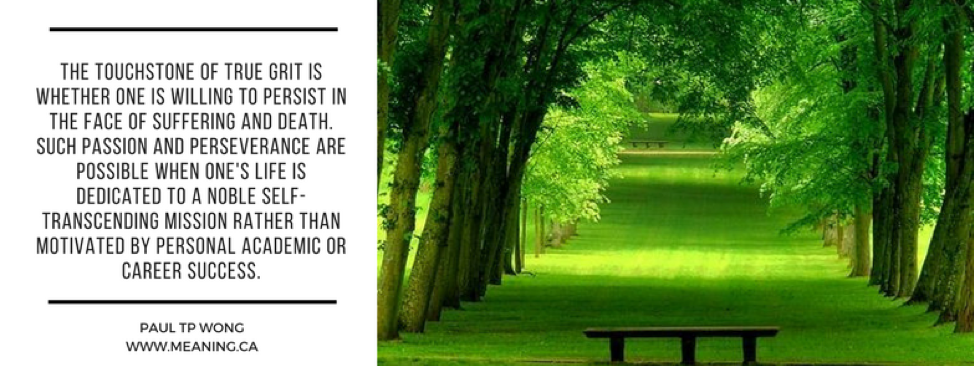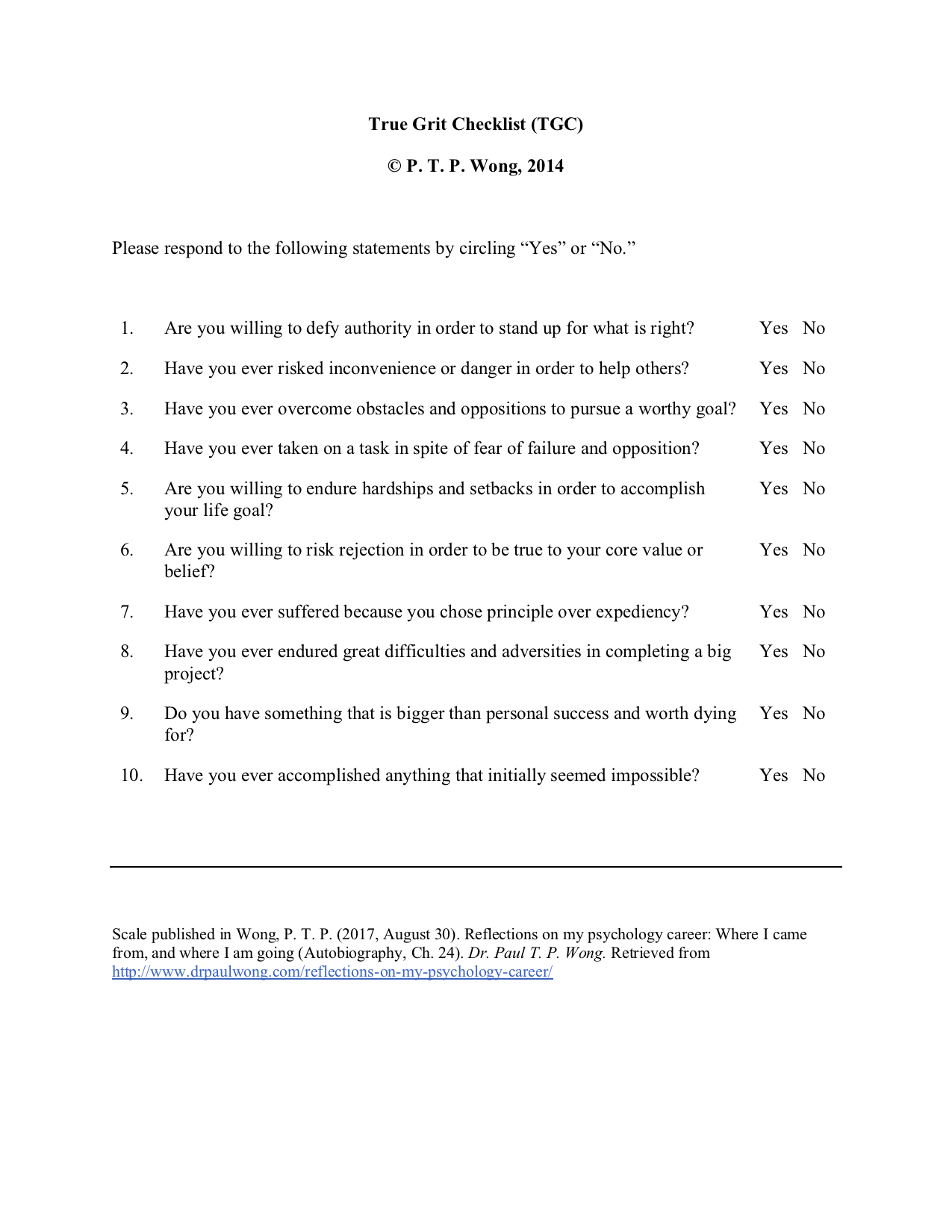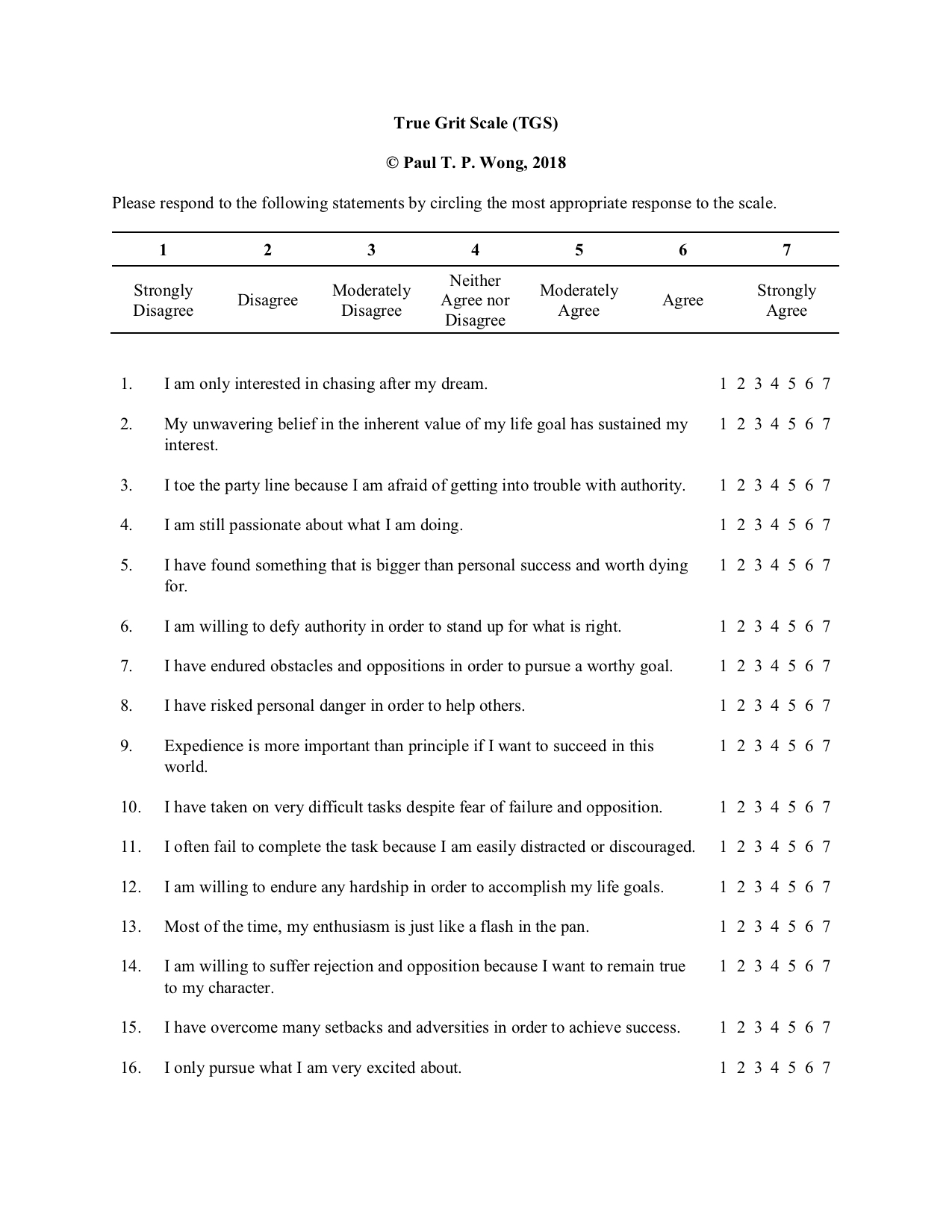“True grit is an unbreakable rope made of many strands: courage, faith, passion, and persistence.”
— Dr. Paul T. P. Wong
The dictionary defines grit as courage and resolve or strength of character. According to Perlis (2013), courage is also the most important characteristic of grit.
Wong (2015) interpreted Frankl’s defiant power of the human spirit as the moral courage to maintain one’s cherished values and human dignity in the face of suffering and death. Wong’s (1995) research has documented that the courage to face failure or pain is the main contributing factor of persistence.
Belief in the meaning and value of one’s mission contributes to sustained passion. Without such conviction, passion cannot be sustained overtime, especially during long stretches of non-reward and setbacks. Wong and Reilly’s (2017) two-factor theory of self-transcendence emphasize the importance of worldview, beliefs, and meaning mindset in sustaining one’s passion or motivation for meaning.
Duckworth asks: What are the two factors (passion and persistence) essential for exceptional performance and success in the traditional achievement settings, such as school or career? (Quast, 2017). From the perspective of second wave positive psychology (PP 2.0), I ask: What are the additional two factors (courage and belief) essential for exceptional capacity for survival and resilience in extraordinary circumstances, such as in the case of a P.O.W. (McCain, 2004; Wong, 2015) or internment at a concentration camp (Frankl, 1985)?
True grit can be best tested in situations that demand the moral courage to stand up for principle (such as whistleblowers and activists) and situations that pose a direct threat to one’s life (such as facing a major surgery, going to the battlefield, or taking part in any dangerous mission).

Instruments
True Grit Checklist (TGC) (Wong, 2014)
Click above to enlarge image or click here to download the PDF for True Grit Checklist (TGC) (Wong, 2014)
True Grit Scale (TGS) (Wong, 2018)
Click above to enlarge image or click here to download the PDF for True Grit Scale (SGC) (Wong, 2018)
References
- Frankl, V. E. (1985). Man’s search for meaning (Revised & updated ed.). New York, NY: Washington Square Press.
- McCain, J. (2004). Why courage matters: The way to a braver life. New York, NY: Random House.
- Perlis, M. M. (2013, October 29). 5 characteristics of grit—how many do you have? Forbes. Retrieved from https://www.forbes.com/sites/margaretperlis/2013/10/29/5-characteristics-of-grit-what-it-is-why-you-need-it-and-do-you-have-it/#21a65b8b4f7b
- Quast, L. (2017, March 6). Why grit if more important than IQ when you’re trying to become successful. Forbes. Retrieved from https://www.forbes.com/sites/lisaquast/2017/03/06/why-grit-is-more-important-than-iq-when-youre-trying-to-become-successful/#4a404aa97e45
- Wong, P. T. P. (1995). A stage model of coping with frustrative stress. In R. Wong (Ed.), Biological perspectives on motivated activities (pp. 339-378). Norwood, NJ: Ablex.
- Wong, P. T. P. (2015). The positive psychology of grit: The defiant power of the human spirit. [Review of the movie Unbroken, directed by Angelina Jolie]. PsycCRITIQUES, 60(25). https://doi.org/10.1037/a0039390
- Wong, P. T. P., & Reilly, T. (2017, August 16). Frankl’s self-transcendence model and virtue ethics (Part 2 of 2). The Virtue Blog. Retrieved from https://thevirtueblog.com/2017/08/16/frankls-self-transcendence-model-and-virtue-ethics-part-2/
Recommended Readings
- Wong, P. T. P. (2009). Viktor Frankl: Prophet of hope for the 21st century. In A. Batthyany, & J. Levinson (Eds.), Existential psychotherapy of meaning: Handbook of logotherapy and existential analysis. Phoenix, AZ: Zeig, Tucker & Theisen.
- Wong, P. T. P. (2015). The positive psychology of grit: The defiant power of the human spirit. [Review of the movie Unbroken, 2014]. PsycCRITIQUES, 60(25). https://doi.org/10.1037/a0039390
- Wong, P. T. P. (2016, March 19). David C. H. Wong (王企祥): An Epitome of True Grit (Autobiography, Ch. 6). Dr. Paul T. P. Wong. Retrieved from http://www.drpaulwong.com/david-c-h-wong-an-epitome-of-true-grit/
- Wong, P. T. P. (2016, July 4). PP 2.0 Summit explores the new vistas of second wave positive psychology: How to embrace the dark side to make life better. Positive Living Newsletter. Retrieved from http://www.drpaulwong.com/inpm-presidents-report-july-2016/
- Wong, P. T. P. (2018, May 11). Four-factor theory of true grit. Dr. Paul T. P. Wong. Retrieved from http://www.drpaulwong.com/four-factor-theory-of-true-grit/
- Wong, P. T. P. (2018, May 15). Meaning therapy and the Toronto van attack. Positive Living Newsletter. Retrieved from https://www.meaning.ca/article/meaning-therapy-and-the-toronto-van-attack/
- Wong, P. T. P. (2018, September 14). Living with cancer, suffering, and death: A case for PP 2.0 (Autobiography, Ch. 27). Dr. Paul T. P. Wong. Retrieved from http://www.drpaulwong.com/living-with-cancer-suffering-and-death-a-case-for-pp-2-0-autobiography-ch-27/
Cite
Wong, P. T. P. (2018, May 11). Four-factor theory of true grit. Dr. Paul T. P. Wong. Retrieved from http://www.drpaulwong.com/four-factor-theory-of-true-grit/



 Meaning Conference 2025 will be the INPM’s first in-person conference with a virtual option after the pandemic.
Meaning Conference 2025 will be the INPM’s first in-person conference with a virtual option after the pandemic.